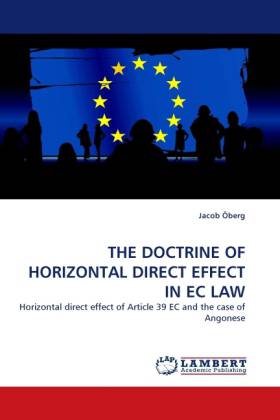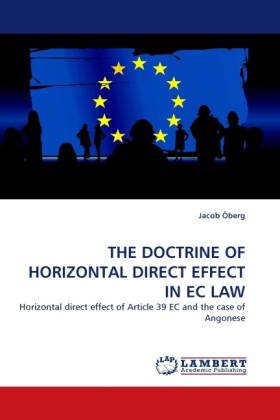
Bedankt voor het vertrouwen het afgelopen jaar! Om jou te bedanken bieden we GRATIS verzending (in België) aan op alles gedurende de hele maand januari.
- Afhalen na 1 uur in een winkel met voorraad
- In januari gratis thuislevering in België
- Ruim aanbod met 7 miljoen producten
Bedankt voor het vertrouwen het afgelopen jaar! Om jou te bedanken bieden we GRATIS verzending (in België) aan op alles gedurende de hele maand januari.
- Afhalen na 1 uur in een winkel met voorraad
- In januari gratis thuislevering in België
- Ruim aanbod met 7 miljoen producten
Zoeken
THE DOCTRINE OF HORIZONTAL DIRECT EFFECT IN EC LAW
Horizontal direct effect of Article 39 EC and the case of Angonese
Jacob Öberg
Paperback | Engels
€ 67,45
+ 134 punten
Omschrijving
In the year of 2000, the ECJ delivered a well-known judgement among European lawyers, Angonese, which indeed recognised horizontal direct effect of community law among private parties in the field of free movement of workers. The ECJ thus held that a job applicant could sue a private bank before the national court on the basis of the prohibition of discrimination in Article 39 of the EC Treaty. Commentators argue that this is a landmark judgment and that Mr. Angonese will now join the annals of community law pioneers". The essential purpose of this book is to provide for an examination and critical analysis of the concept of horizontal direct effect in the field of free movement of workers, in particular to analyse in what manner the ECJ legally justified the recognition of this concept in relation to Article 39 EC.
Specificaties
Betrokkenen
- Auteur(s):
- Uitgeverij:
Inhoud
- Aantal bladzijden:
- 84
- Taal:
- Engels
Eigenschappen
- Productcode (EAN):
- 9783844315066
- Verschijningsdatum:
- 8/03/2011
- Uitvoering:
- Paperback
- Afmetingen:
- 152 mm x 229 mm
- Gewicht:
- 136 g

Alleen bij Standaard Boekhandel
+ 134 punten op je klantenkaart van Standaard Boekhandel
Beoordelingen
We publiceren alleen reviews die voldoen aan de voorwaarden voor reviews. Bekijk onze voorwaarden voor reviews.









